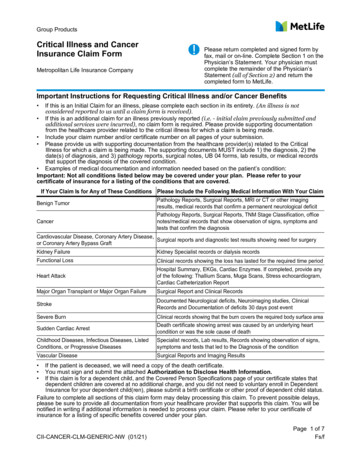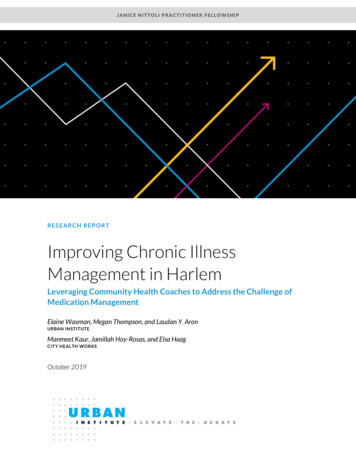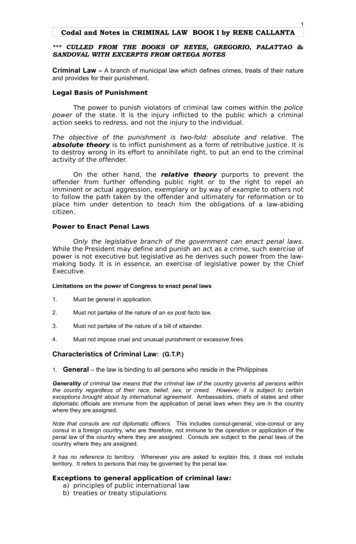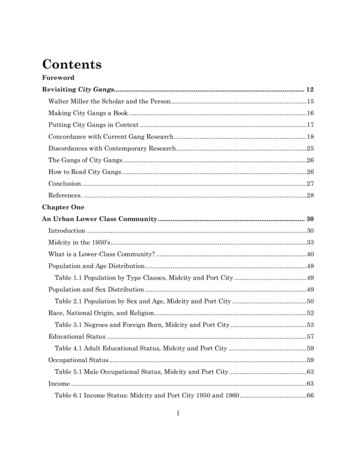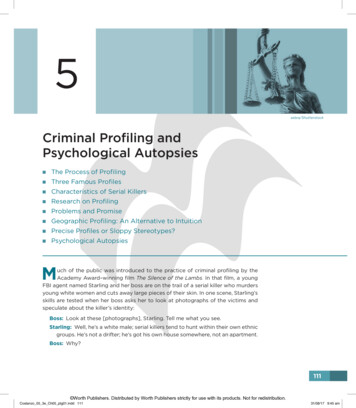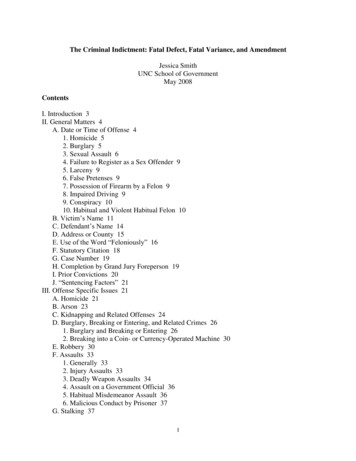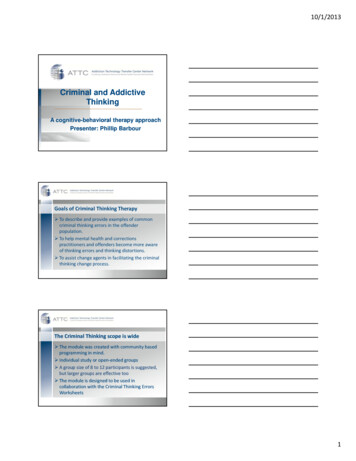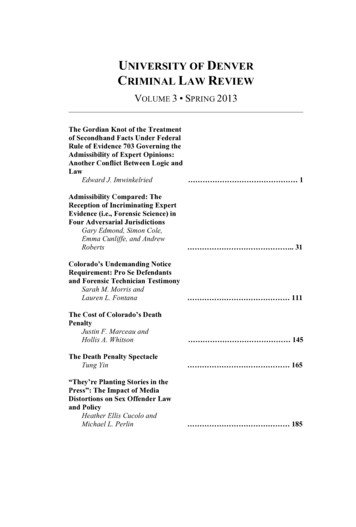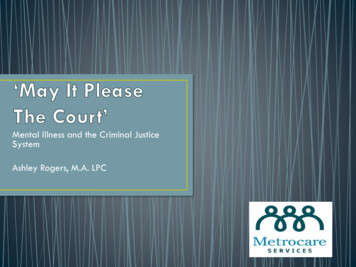
Transcription
Mental Illness and the Criminal JusticeSystemAshley Rogers, M.A. LPC
1. Dallas County Diversion Program – options, components, andinterventions2. Outline of the Dallas County Court System and requiredcollaboration between the mental health provider and theCourts3. The outcomes - how are the programs successful?
Traditional Drug CourtsDWI CourtsMH/Co-Occurring CourtsFamily CourtsProstitution CourtsReentry CourtVeterans CourtsJuvenile Drug Courts160 Specialty Courts in theState of Texas13 Dallas County AdultSpecialty CriminalCourts
WHAT ARE THE FELONY LEVELS AND PUNISHMENTS IN TEXAS? A state jail felony- confinement for a term not to exceed 180 days to two years in a state jail; and or afine not to exceed 10,000. ( example: Credit Card Abuse, Unauthorized use of a motor vehicle,Reckless injury to a Child. A 3rd degree felony – confinement for a term from two to 10 years in prison ; and an optional fine notto exceed 10,000. ( example DWI 3rd, Indecency with a child, Kidnapping, Possession of a firearm by aFelon. A 2nd degree felony is 2 to 20 years in the TDCJ Institutional Division, and a optional fine not to exceed 10,000. ( examples Aggravated Assault or kidnapping, Arson, Robbery, sexual assault. A 1st degree felony is 5 years to 99 or life in prison and /or a 10,000 fine.( example Murder,Aggravated Kidnapping, Robbery or sexual Assault., Capital Crimes could be either death or life in prison. If the state does not seek the death penalty, uponconviction, the jury must answer the questions which may result in either sentence of life imprisonment orthe death sentence. ( examples : murder during the commission of another felony such as kidnapping,rape or robbery.
Different Levels ofOffensesAt the Frank Crowley Court house, offenses are prosecuted at the lowestlevel of Class B misdemeanor up to the highest level of First DegreeFelony. Examples of each type of offense and the possible ranges ofpunishment are as follows: Class B misdemeanor – confinement for a term not to exceed 180days in in the county jail: and or a fine not to exceed 2,000 .(example DWI (“drunk driving”), Criminal Trespass, Theft by check 50to 500, evading arrest or detention. Class A misdemeanor – confinement for a term not to exceed oneyear in the county jail; and or a fine not to exceed 4,000. ( exampleDWI 2nd, Assault, Burglary of a vehicle, Unlawfully carrying aWeapon. Class C misdemeanor is essentially an offense similar to a traffic ticketwhere it’s punishable by fine only of up to 500.
Diversion programs are a collaborative effort between MetrocareServices and the County Court System to allow eligible clients,who have been arrested for a misdemeanor and/or some eligiblefelony offenses, to be released back into the community toparticipate in an intensive mental health program.Clients and their assigned clinicians are required to appearbefore the judge at least two times a month and clients mustdemonstrate participation in the recommended treatment planalong with progression through the phases of the court program.Successful completion of the program results in dismissal of theclient's offense.
Misdemeanor Mental Health Court - Judge Kristin Wade/CountyCriminal Court APP1 ATLAS (Achieving True Liberty and Success) - Judge TeresaHawthorne/ 203rd Judicial District Court STAC (Successful Treatment of Addiction Through Collaboration) –Judge Lela Mays/Magistrate Judge STAR(Strengthening Transistion and Recovery) - Judge ElizabethFrizzel/Criminal District Court #7 DDC (Dual Diagnosis Aftercare Court) - Judge Jennifer Bennett/265th Judicial District Court PRIDE (Positive Recovery Intensive Divert Experience) – Judge PeggyHoffman/County Criminal Court #9 OCR – (Outpatient Competency Restoration) – Judge Skemp
Judge Kristin Wade / County Criminal Court APP1The Misdemeanor Mental Health Court was initiated on September 1, 2004. This is a true diversion court.Clients that successfully complete this 6 months program will have misdemeanor case dismissed by theDallas County District Attorney’s Office. This court and its assigned specialized community supervisionofficer works very closely with county mental health service providers to insure that all clients areparticipating in treatment and are regularly taking their medication as directed.The program is voluntary. The average census is 45 clients.Eligibility Requirements:Clients in this program must be pre-adjudication.Referral Process:Most referrals from this court come from the D.A’s office. Referrals also come from the specialty court coordinatorfrom the jail.
Onceapproved thePublicDefender willspeak with theclient to see ifthey areinterested inthe program.SPN & ReleaseThe client willcomplete aninterview withthe probationofficer todetermineappropriateness.Public DefenderProbation OfficerADA & MHJDCMHJDC andADA reviewthe BOT forNorthstarmatches.Those thatmeet Northstarand criminalcriteria areplaced on thejail chain.If clientagrees toprogram, aSPN isassigned tocomplete aninterview.Release isscheduled.
Judge Teresa Hawthorne / 203rd Judicial District CourtThe ATLAS Court was initiated on January 1, 2006. Clients accepted into this program must have a diagnosedmental health conditions issue and have a motion to revoke probation pending against them. This court works invery close partnership with the county mental health service treatment providers. Clients are monitored byspecialized community supervision officers and mental health case managers to insure medication compliance,probation conditions and counseling attendance.The program length is 12 months with an average client census of 60 clients.Eligibility/Referral Requirements: Defendant must have a current FELONY CASE (Pre/Post Sentence)Pre-sentence cases must be recommended by the courtPost-sentence must be in revocation status, or in court with a violationMust have a CATS (Comprehensive Assessment and Treatment Services) evaluationClients must meet the criteria of Axis I Diagnosis and a willingness to work the program, which includes weeklyreporting, weekly court appearances, SOP, IOP, and taking prescribed medication.
Onceapproved thePublicDefender willspeak with theclient to see ifthey areinterested inthe program.SPN & ReleaseThe client willcomplete anevaluationwith CATS.CATS willmake arecommendation andreview withthe judge.ApprovalCATSProbationReferrals comeinto probationfrom the field.Referrals canalso come fromthe attorney.If clientagrees toprogram, aSPN isassigned tocomplete aninterview.Release isscheduled.
Judge Lela Mays / Magistrate JudgeThe STAC Court was initiated in February 1, 2007. Clients are assigned to court after having successfullycompleted six months of inpatient treatment for substance abuse at the Dallas County Judicial Treatment Center inWilmer, Texas. All clients receive an in-depth clinical assessment prior to their treatment. This re-entry courtpromotes sobriety through the assistance of intensive outpatient treatment, supportive outpatient treatment,individual counseling, probation supervision and the twelve step recovery program.The program is 12-18 months with an average census of 350 participating clients.Eligibility Requirements:The Dallas County Judicial Treatment Center (JTC) is a post adjudication Drug Court which integrates therapeuticjudicial oversight, specialized aftercare treatment and multi-disciplinary case management to persons placed onFelony Probation in Dallas County.Referral ProcessAll clients coming into STAC Court must be referred directly from Phoenix House residential treatment facility,after successful completion of the program.
Judge Elizabeth Frizell/Criminal District Court #7The STAR Court was initiated on July 1, 2008. Participants accepted into this program are women, adjudicatedfor felony prostitution and placed on probation. Clients either complete treatment at the Dallas County JudicialTreatment Center, the Dallas County Dual Diagnosis Center or the state prison SAFPF program. Specializedcommunity supervision officers provide for very regular supervision and case management. Outpatient treatmentis provided if indicated via diagnosis and clinical assessment. Local contracted residential treatment programsprovide the anchor to community based drug, alcohol and mental health treatment.The program is 12-18 months with an average census of 35 clients.Eligibility Requirements:To participate in STAR court the client must: Live in Dallas CountyHave been charged with prostitution 3rd or moreBe willing to leave sexually oriented businessesMust have a CATS recommendation.If your client has an assaultive history her participation in Star court will be determined on a case by casebasis.
Judge Jennifer Bennett/ 265th Judicial District CourtThe Dual Diagnosis Court was initiated on May 1, 2008. All clients have a clinical assessment diagnosing a mentalhealth condition. Clients accepted into this program complete inpatient treatment for 90 days at the Dual DiagnosisCenter at the Dallas County Judicial Treatment Center in Wilmer, Texas. Upon completing residential treatment allclients are then referred to this unique re-entry court. Once in the court, the probation officer and assigned casemanagers will work with the client to maintain their medication regimen and address their ongoing substance abuseissues. The court works in partnership with Metrocare Services of Dallas.The program is 6-9 months with an average census of 180 clients.Eligibility Requirements:The Dallas County Dual Diagnosis Court (DDC) is a post adjudication problem-solving court which integratestherapeutic judicial oversight, specialized treatment and multi-disciplinary case management to persons placed onFelony Probation in Dallas County who ALSO have been diagnosed with a co-occurring disorder.Referral Process:All clients coming into the Dual Diagnosis Court must be referred directly from the Phoenix House residential DualDiagnosis Treatment facility, after successful completion of the program.
Judge Peggy Hoffman / County Criminal Court #9The PRIDE Court was initiated on February 1, 2009. Female clients, arrested for misdemeanorprostitution, are referred through the program through general jail review and from theDallas Police Department’s Prostitution Initiative and/or thru the misdemeanor courts. Thecourt and the specialized community supervision officer assigned, work closely with the drug,alcohol and mental health providers within the county to provide for treatment services forparticipating clients.This program ranges form 6-9 months and is designed to maintain an average census of 35clients.Eligibility Requirements:Clients referred to this court must be pre-adjudicationCannot have a Felony prostitution conviction
Judge Doug Skemp/ ICR/OCR County Criminal Court #3The OCR Court was initiated in 2007 after important legislation passed.Competency restoration is defined by the court as the treatment process for restoringone’s ability to consult with his or her attorney with a reasonable degree of rationalunderstanding, and a rational and factual understanding of the proceedings againstthem.Eligibility Requirements and Referral Process is more complicated for this court. Seeadditional explanation to follow.
A need for a competency evaluation is identified if; The defendant is unable to cooperate with their legalcounsel to make rational decisions in their defense. The defendant does not have a factual and/or rationalunderstanding of legal process.
Once a need for a competency evaluation is identified, the followingsteps occur The judge issues an order for a competency evaluation. The order gets sent to the forensic psychologist who has been requested to completethe evaluation. (Dr. Pittman, Dr. Clayton or Dr. Compton). The doctor completes the evaluation and makes a recommendation for inpatientcompetency restoration (ICR) or outpatient competency restoration (OCR).
The client is assigned to one of the Clinic’s who will interview them forOCR Once accepted, the Clinic completes a treatment plan for thedefendant and the Judge meets the defendant to discuss theexpectations of the defendant while in the OCR program. The competency coordinator coordinates the release from jail to theClinic and the defendant is expected to report to court monthly forfelony cases and bi-monthly for misdemeanor cases.
A competency hearing to order inpatient treatment iscompleted Once the hearing is complete, a packet gets submitted to theclearinghouse to determine which hospital the defendant shouldgo to. Once the packet has been received, the defendant gets put ona list and must wait until a hospital bed becomes available.
Each specialty court is assigned a Qualified Mental HealthProfessional who carries a caseload of 20-25 individuals. Interdisciplinary Treatment Team meetings are held weekly inconjunction with the court to provide comprehensive treatment andmonitoring of the progress and challenges the individuals areexperiencing Individuals are provided with intensive case management, mentalhealth and/or substance abuse counseling, psychiatric evaluation andtreatment including medication services and management, communityresource linkage, along with housing and education assistance Individuals are provided same day services with a prescriber whenbeing released from jail for a mental health assessment andmedication services.
Our programs are funded through TCOOMMI (TexasCorrectional Office on Offenders with Medical and MentalImpairments) and Northstar/Value Options We are able to provide same day psychiatric services toindividuals with no waiting period because of our partnershipwith Northstar and TCOOMMI Ongoing dialogue, accountability, and collaboration betweenservice providers and the court. Active participation in a monthly steering committeecollaborative along with spear heading a sub-committeespecifically for the specialty divert programs
Metrocare ServicesSpecial Needs Offenders Program (SNOP)3330 S. Lancaster Road/Annex BuildingDallas, TX. 75216Sherri Lockhart, CM V 972-528-5929Ashley Rogers, CM IV 972-861-5936ashley.rogers@metrocareservices.org
At the Frank Crowley Court house, offenses are prosecuted at the lowest level of Class B misdemeanor up to the highest level of First Degree Felony. Examples of each type of offense and the possible ranges of punishment are as follows: Clas
